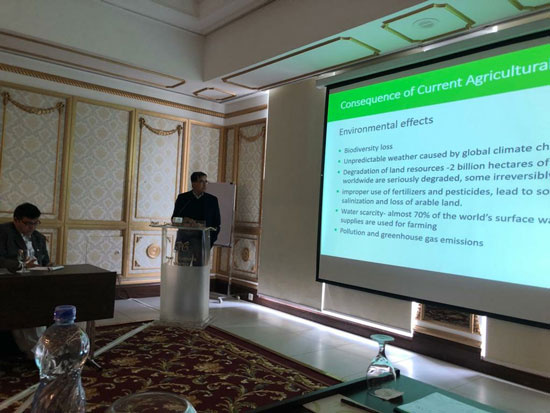Observer Report
Lahore
There is a dire need to promote sustainable means to grow food and embrace technological innovations for the national food security already threatened by climate change, scarcity of water and burgeoning population.
This was stated by speakers addressing a workshop on ‘Sustainable Agriculture’ organised by the CropLife Pakistan Association in collaboration with the Agriculture Journalists Association (AJA). The event aimed to highlight importance of sustainable agriculture in the face of numerous challenges to national food security. As compared to 1950, global population will be 300 per cent in 2020, while arable land in this period will increase only by 15 per cent thus bringing down the farmland availability by 60 per cent per person per hectare.
More than 25 journalists covering the agriculture sector from leading English and Urdu media outlets attended the two-day workshop.
In his introductory presentation, Dr. Muhammad Afzal, Executive Director CropLife Pakistan, explained that growing population, climate change, scarcity of water and changing lifestyles continue to pose challenges to the national food security, emphasizing the need to promote sustainable means to grow food and embrace technological innovations that enable the same. “This workshop for media professionals is part of CropLife Pakistan’s broader effort to create awareness and understanding of agriculture technologies. We hope this interaction provides the participants a fresh perspective and adds to their knowledge”, he added.
Subsequent speakers also highlighted the importance of an enabling business environment that encourages investments in innovative technologies, with specific focus on enhancing crop productivity while reducing impact on the environment.Sustainable agricultural practices involve the judicious use of water resources, minimizing soil erosion, reducing fuel consumption and optimizing land utilization. While providing an overview of sustainable agriculture technologies, Dr. Muhammad Afzal explained at length the benefits of biotechnology in relation to promoting sustainable agriculture. “Biotechnology allows farmers to produce more using fewer resources; it has the potential to reshape productivity in Pakistan by addressing both climate change and food security challenges,” he further reiterated.
Dr. Afzal also pointed out that the Government of Pakistan has had a clear policy on biotechnology for the past three decades and has invested heavily towards research and development of this technology, emphasizing those regulatory decisions must be consistent with this policy to build confidence of the plant science industry.









